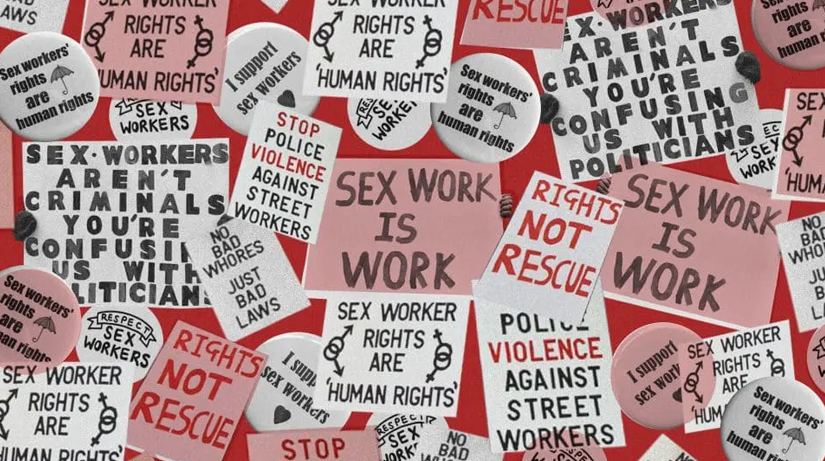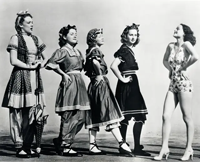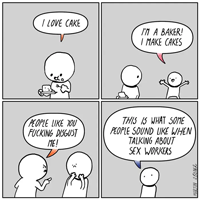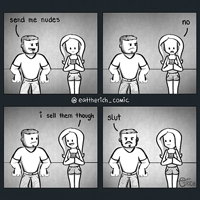Dialogues of Camming: Deeper than the Tip
October 15, 2024 33 minutes 18072Welcome! I'm Ophelia, a seasoned cam artist with over 15 years of experience. As LittleRedBunny, I've become one of the most awarded and respected models in the industry. In this space, I'll be sharing my insights on all things camming, with a focus on helping you achieve your goals and create a fulfilling career.
Sex Work – Victorian Views in the Information Age

Getting ready for your online performance – the perfect outfit, flawless makeup, a well-lit set-up. Whether you're live streaming or pre-recording content, your livelihood revolves around online creation. This includes YouTubers, gamers, adult performers, and sex workers.
The key difference? Banks, payment processors, and other companies can restrict adult performers' ability to receive payment or utilize platforms for performing or selling content.
While these restrictions often aim to combat sex trafficking and protect human rights, a crucial distinction gets lost: sex work and sex trafficking are not synonymous. Unfortunately, conflating these terms often harms consenting adults who choose adult entertainment as a legitimate source of income.
The Double Standard: Why Sex Work Carries a Stigma
 Why does adult industry work face such distinct societal disapproval compared to other professions? We utilize our bodies for our craft, just as a surgeon uses their hands, a scientist their mind, or an athlete their bodies. While the body parts differ, the dedication and skill required are just as real. Society finds it acceptable for fashion models to strut down runways in barely-there outfits or for magazine covers to feature scantily clad celebrities. Yet, when sex appeal becomes an integral part of our work, it's inexplicably taboo. This is blatant discrimination, and the stigma surrounding adult work is undeserved.
Why does adult industry work face such distinct societal disapproval compared to other professions? We utilize our bodies for our craft, just as a surgeon uses their hands, a scientist their mind, or an athlete their bodies. While the body parts differ, the dedication and skill required are just as real. Society finds it acceptable for fashion models to strut down runways in barely-there outfits or for magazine covers to feature scantily clad celebrities. Yet, when sex appeal becomes an integral part of our work, it's inexplicably taboo. This is blatant discrimination, and the stigma surrounding adult work is undeserved.
This biased view, whether intentional or not, perpetuates a long history of discrimination against adult industry workers and those who leverage their bodies and sexuality for an income. The taboo against sex itself is a complex issue we'll explore further, but it's important to recognize that sex work can offer positive aspects for society.
Sex Workers' Rights & Historical Context
The fight for sex workers' rights is intertwined with human rights movements. Organizations like the United Nations, Human Rights Watch, and Amnesty International recognize sex workers' rights as fundamental human rights. While this recognition has roots in the Universal Declaration of Human Rights in 1948, a long history of discrimination and violence against sex workers persists.
Sadly, sex workers are often subject to negative stereotypes, such as "daddy issues," "abuse victims," or lacking "potential beyond their bodies." These stereotypes contribute to a larger societal issue of discrimination against not just sex workers, but also women and LGBTQ+ individual’s rights as well.
A Timeline of Progress and Persecution:
To understand this complex issue, let's explore some key historical moments that impacted sex worker rights, women's rights, and the ongoing battle against discrimination:
1800s: Modesty Reigns Supreme
Due to strict morality laws and ideals of modesty, women at the beach were required to wear "bathing dresses" that covered most of their bodies. These cumbersome garments, often made of wool, were designed for wading, not swimming. Unfortunately, when wet, the dresses became waterlogged, dragging women down and contributing to a high drowning rate in the late 19th century.
1873: Comstock Laws Clamp Down
The Comstock Laws, passed in the U.S., aimed to restrict the spread of "obscene" materials. This included not just sex toys, contraceptives, and abortifacients, but also information on sex education and birth control.
1896: A Scandalous Screen Kiss
The alleged first on-screen kiss between actors May Irwin and John Rice, captured on Thomas Edison's Vitascope projector, shocked audiences. Deemed "hard to bear" by most people of the time, the scene was banned in many places.
1920: Women Gain the Right to Vote
A significant turning point: the 19th Amendment to the U.S. Constitution granted women the right to vote, a victory for the long struggle of the Women's Suffrage Movement.
1922: Policing Beach Attire
U.S. regulations in many states dictated that women's bathing suits could only reveal their legs up to 6 inches above the knee. "Bathing suit patrols" enforced these laws, with women facing police citations for non-compliance.
1946: The Bikini Makes a Splash (Eventually)
French engineer Louis Reard introduced the bikini, which was initially met with disapproval in the U.S. However, Ursula Andress' iconic bikini entrance in the James Bond film "Dr. No" (1962) helped usher in a new era of beachwear acceptance. Soon after, beach attire laws began to relax.
1960: The Pill and a New Era for Women
The Food and Drug Administration (FDA) approved the birth control pill in 1960, marking a major turning point for women's sexual liberation. This newfound control over reproduction empowered women and significantly impacted societal views on sex, marriage, and family planning.
1963: Equal Pay for Equal Work
The Equal Pay Act of 1963 mandated equal pay for men and women in the same position. This landmark legislation addressed historic gender pay gaps and fostered greater economic equality.
1964: Civil Rights Act and Expanding Protections
The Civil Rights Act of 1964 outlawed discrimination based on race, color, religion, sex (including pregnancy later), and eventually extended to sexual orientation and gender identity. This act played a crucial role in promoting equal opportunities for women.
1970s: Feminism and Debates on Sexuality
Feminist scholars Catharine MacKinnon and Andrea Dworkin argued that much sexual imagery, particularly that depicting women in heterosexual intercourse, constituted a violation of women's civil rights, akin to rape, and promoted violence. Their views sparked significant debate within the feminist movement.
1980s: Sex Positivity and Empowering Women
Sex-positive feminists like Betty Dodson and Gayle Rubin challenged the notion that all heterosexual intercourse was inherently exploitative for women. They advocated for a view of sexuality as potentially mutually pleasurable for both partners. This perspective also started to consider the sex industry and prostitution as a potential source of female empowerment, though the topic remains complex.
2018: SESTA/FOSTA and the Impact on Sex Workers
In an attempt to combat online sex trafficking, the U.S. Congress passed the Stop Enabling Sex Traffickers Act (SESTA) and Allow States and Victims to Fight Online Sex Trafficking Act (FOSTA) in 2018. However, these bills have been criticized for inadvertently making sex workers more vulnerable by hindering their ability to screen clients and access safe online platforms. Additionally, these laws caused banks to close accounts of adult performers and sex workers without warning, disrupting their income streams.
2020: Pornhub and the Child Exploitation Controversy
A lawsuit filed against Pornhub in 2020 alleged the company "knowingly and intentionally" profited from sexually explicit content involving child exploitation, men, and women. This case raised serious concerns about content moderation on adult platforms. Following the lawsuit, financial institutions like MasterCard stopped working with Pornhub, leading to income loss for many sex workers on the platform.
2021: OnlyFans and the Shifting Landscape
Citing pressure from banks, OnlyFans, a platform popular with adult creators, announced it would ban sexually explicit content in 2021. However, they reversed their decision within days due to backlash. This episode highlights the ongoing tension between sex worker rights and content moderation concerns within online platforms.
2022: Roe v. Wade Reversal and Its Broader Implications
In 2022, the Supreme Court's reversal of Roe v. Wade allowed states to dictate their abortion laws, resulting in severe restrictions in conservative states while blue states continued to protect abortion rights. This shift not only impacted reproductive rights but also had broader implications for marginalized communities, including sex workers, who often rely on safe, accessible healthcare services. As states adopt increasingly punitive measures, the landscape for sex workers remains precarious, with heightened risks to their safety and well-being.
Stigma Hinders Progress in the Adult Industry
 Despite societal progress in technology, science, and even social issues, a stubborn stigma still clings to the adult industry.
Despite societal progress in technology, science, and even social issues, a stubborn stigma still clings to the adult industry.
When interest groups pressure politicians and financial institutions to limit sex workers' ability to earn a living, their access to income becomes precarious. This control tactic bears an uncomfortable resemblance to how some governments like China restrict citizen freedoms. While I know it sounds like a "slippery slope" argument, is it truly a stretch to imagine further restrictions on our livelihoods? Could we be forced back into the shadows of the pre-1970s era?
It's frustrating to see roadblocks placed in our path during a seemingly progressive time. These restrictions aren't applied to fast food or alcohol, which are considered socially acceptable "vices" within our freedom of choice. Similarly, consenting adult interactions, whether for income or pleasure, shouldn't be subject to such limitations. Sex is a healthy expression of human sexuality, and it seems hypocritical to restrict a natural act while allowing potentially unhealthy food and drinks.
However, this isn't the main point. With rising social media censorship and increased isolation due to COVID, outlets for natural needs and desires are more crucial than ever. Suppressing access often fuels the desire, leading people to find alternative, potentially unsafe ways to express themselves.
The Positive Impact of Adult Entertainment
Adult workers and entertainers can provide more than just physical gratification. We offer a safe outlet for exploration and release, and for some, a bridge to social connection. For individuals struggling with loneliness, isolation, or difficulty expressing desires, adult entertainment can be a source of comfort and relief, potentially reducing feelings of depression and alienation.
Interestingly, studies suggest a correlation between countries with legalized and regulated prostitution and lower overall crime rates and even lower divorce rates compared to those with criminalized sex work. Restricting access to, and employment within, the well-regulated adult industry seems counterproductive, especially during times of increased social isolation.
Personally, I've received countless expressions of gratitude from members and guests who credit me with improving their lives or helping them through difficult times. While many might assume that interaction with adult performers is solely about sex, the reality is often far more nuanced. I've had the privilege of positively impacting people's lives on a personal level, and I know I'm not alone in this experience. We, as adult entertainers, contribute positively to society in ways that extend beyond common perceptions.
Freedom of Choice and Responsible Consumption
 It's unfair to solely criticize sex workers. We should be looking at the root causes of why people seek out adult entertainment. Sexuality has been a part of human experience since the beginning, and consenting adults should have the freedom to explore their desires. If two adults engage in something that is mutually agreeable and harms no one, then it's a private matter.
It's unfair to solely criticize sex workers. We should be looking at the root causes of why people seek out adult entertainment. Sexuality has been a part of human experience since the beginning, and consenting adults should have the freedom to explore their desires. If two adults engage in something that is mutually agreeable and harms no one, then it's a private matter.
There's a double standard at play. People may judge sex workers but engage in private acts of self-gratification or release stress with sex partners. Sex is a natural part of life, so why is viewing women in bikinis or going to strip clubs considered acceptable, while performing actual or simulated sex acts is not?
Similar to food choices, consuming adult content is a personal decision. While excessive fast food consumption can be unhealthy, it's ultimately an individual’s prerogative to eat healthy or binge on junk food. Likewise, watching adult content can be done responsibly and in moderation.
While efforts to combat sex trafficking often have good intentions, the implementation can unintentionally cause more harm to legitimate sex workers. The OnlyFans situation during COVID, where content restrictions and income loss were feared, exemplifies this concern. Many adult performers rely on this platform to make a living, and similar situations occur when banks and payment processors become restrictive, making it difficult for them to receive payment. This lack of stability creates anxiety and fear about receiving earned income.
Resilience, Challenges, and Change
 The COVID pandemic forced many people to seek alternative sources of income. The adult industry saw an influx of new workers, some by choice, others due to limited options. However, this shift has been met with increased stigma and attempts to restrict adult workers' ability to earn a living, even when their work is consensual and virtual.
The COVID pandemic forced many people to seek alternative sources of income. The adult industry saw an influx of new workers, some by choice, others due to limited options. However, this shift has been met with increased stigma and attempts to restrict adult workers' ability to earn a living, even when their work is consensual and virtual.
This raises a crucial question: Should financial institutions and governments dictate how people make a living, particularly when it involves consenting adult activities? Many sex workers have shown remarkable resilience by adapting their content creation, distribution methods, and income streams during the pandemic. However, the constant threat of restrictions creates financial insecurity and hinders long-term planning.
The adult industry fosters self-reliance, demanding constant adaptation to changing circumstances. For some, sex work was a necessity due to limited options, and for others the best possible choice to make ends meet. Shouldn't all forms of honest work be viewed with respect, regardless of whether it's in restaurants, retail, or providing services like mechanics, accounting, or adult entertainment?
Furthermore, a concerning trend exists: discrimination against former sex workers seeking "traditional" employment. Women have lost jobs solely due to past adult work or even non-monetized "sexy" social media posts. Isn't personal life separate from professional qualifications? This kind of judgment perpetuates an atmosphere of intolerance and limits opportunities for reintegration into the workforce.
Moving Forward
The question remains: how can we change public perception of the adult industry to ensure safer working conditions and financial security for sex workers? How can we dismantle the long-standing stigma before livelihoods are further threatened?
xx, O
Contact or give feedback and suggestion to LittleRedBunny at:
Twitter – @LittleRedBunnyx and @littleredacadem
Facebook – www.facebook.com/TheArtofCamming
To learn more about and contact the LittleRedBunny Academy visit: http://www.littleredbunny.com/littleredacademy/
We understand that life can get tough, if you are in need of emotional support, please reach out to Pineapple Support. They offer all persons working in the adult online media entertainment industry free, anonymous, 24/7 online emotional support as well as professional counselling and therapy services.
Looking for support is courageous and Pineapple Support is here to help you with your journey.
Other Guides

I want to be a camgirl, now what?
30 minutesWe understand it can be scary to start for the first time. This “Now what?” extensive guide (interesting for starting models as well as models with more experience) will help you on your way. It will show you the necessary steps, but there are also tips and tricks to make your journey as a cam model into a success.
Read Guide
Camming Security an extensive guide
29 minutesThis guide is for for anyone who is a cam performer to help ensure their online security. It is not meant to be exhaustive but tries to be comprehensive. From Banking to Webbrowers and Meta data to Wish lists. All will be here. Though it’s geared toward US-based cammers, many of the topics discussed apply to any cammer.
Read Guide
5 common camgirl questions, video guide
0 minutesVanessa Eve answers 5 camgirl questions in this WeCamgirls exclusive! She starts with: 'Do I need to show my face?' and 'What is your payout percentage?' In 'Am I an independent or studio model?' she explains studios and in 'How do I become a top model?' and 'What kind of equipment should I use?' she gives advice.
Read Guide
FinDom, JOI and other fetish guides
15 minutesDiscover a range of informative guides on fetishes. Whether you're interested in learning about domming, JOI, or intrigued by the concept of financial domination, you'll find everything you need to know right here. Explore the world of fetishes and maybe you will find something that will work for you too.
Read Guide
Financial and Time management
23 minutesDiscover guides on financial management and time management here, as well as tips and tricks. Find out how much you can earn, determine a fair fee, and learn the optimal times to be online. Learn more about outsourcing , so you can focus on what you do best. Remember, time is your most precious asset.
Read Guide
Marketing and promotion tips
35 minutesMarketing is an essential aspect of business that helps cam models reach their target audience, build a fanbase, and increase your income. Here you will find a couple of quick guides, about for example, why you should use social media, how to promote your website and information about affiliate marketing.
Read Guide
Sex Work CEO videos and tutorials
0 minutesFounded by Melrose Michaels, SexWorkCEO offers free resources and education for adult creators in various industry niches to empower the online sex work community. Its mission is to assist in filling skill gaps, fostering stronger, more independent businesses within the adult industry and to recognize your potential!
Read Guide
How does StripChat work?
19 minutesStripchat, an adult entertainment site, features professional and amateur adult performers. It operates on a token-based system, allowing users to interact with models. Camming on Stripchat offers flexibility and self-employment, suitable for anyone aged 18 or older, regardless of gender or identity.
Read Guide
How does Chaturbate work?
16 minutesChaturbate is an interactive adult streaming platform that fosters acceptance and exploration. Anyone aged 18 or older can be a broadcaster and they welcome all people regardless of gender or identity. Chaturbate's appeal lies in its inclusivity and the freedom to be oneself while pursuing personal interests and desires.
Read Guide
How does Cam4 work?
22 minutesIn today's world, there are plenty of chances for people to express themselves and start their own businesses. Cam4 is one place where you can do both. Whether you're new to camming or already have a following, Cam4 lets you show off your talents, talk to people from all over the world, and even make money doing what you enjoy.
Read Guide
How does Xcams-Xmodels work?
12 minutesThere are many online opportunities for models to show what they're good at. From the beginning, Xcams-Models has put a lot of effort into its adult webcam platform. Whether you're new to camming or already have fans, Xcams-Models lets you share your talents and chat with people from all over the world.
Read Guide
How does ePlay work?
16 minutesThere are numerous online platforms where models can display their skills, and ePlay stands out for its dedicated adult webcam services. Whether you're just starting in the camming world or already have a loyal fanbase, ePlay provides the perfect space to share your talents and engage with viewers from across the globe.
Read Guide
Premium Webcams
11 minutesThis guide dives deep into the world of premium webcams, helping you uncover the champion for your specific needs. Whether you crave the crispest possible image, need a low-light hero, or simply want a feature-packed powerhouse, this guide will help you on your way.
Read Guide
How does Cherry.TV work?
12 minutesCherry.tv is a webcam streaming platform that combines gaming with the interactive appeal of social media, creating a unique and engaging experience for both performers and viewers. By integrating gamified features such as achievements, rewards, and virtual gifts, Cherry.tv offers models a dynamic way to connect with their audience while boosting their earnings.
Read Guide
The Pineapple Support 2024 Mental Health Summit
3 minutesThe 2024 Mental Health Summit was a four-day virtual event exploring the complexities of relationships in the adult industry. Hosted by Laura Desiree, it featured 60-minute expert-led presentations and panel discussions on balancing personal and professional relationships while maintaining mental wellness.
Read Guide